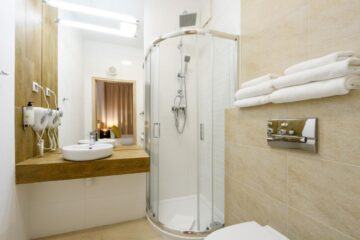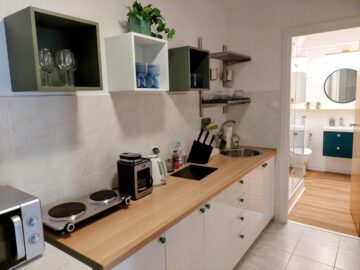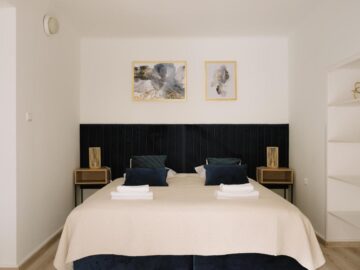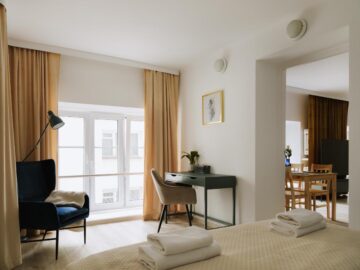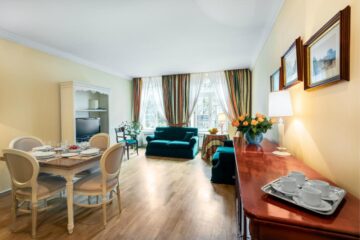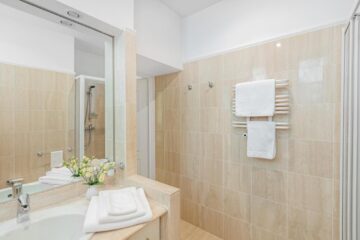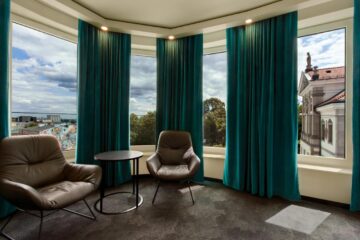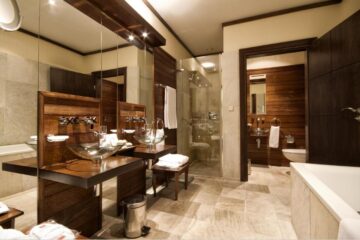Warsaw is an emerging hub for digital nomads, offering affordable living, fast internet, and a growing number of co-working spaces. Popular areas like Śródmieście and Praga are home to work-friendly cafes and modern workspaces. The cost of living is lower than in many Western European cities, making it attractive for long-term stays. Warsaw’s efficient public transport system and rich history provide plenty to explore outside of work. With a vibrant expat community and regular networking events, it’s easy to connect with like-minded professionals.
Nomad Score: 7/10 ・ Cost of living: $3100/month ・ Internet speed: 230 Mbps
▶ Varsovia Apartamenty Kasprzaka – Standard Apartment
▶ Apple Inn – Double or Twin Room
▶ Residence St. Andrew’s Palace – Superior Suite
▶ Motel One Warsaw-Chopin – Standard King Room with City View
▶ Mamaison Le Regina Boutique Hotel – Classic Double Room
This guide will help you navigate life in Warsaw as a digital nomad, balancing productivity with the city’s rich cultural offerings, vibrant community, and affordable living:
1. Internet and Connectivity
- Wi-Fi: Warsaw offers reliable, high-speed internet across most of the city. Cafes, co-working spaces, and public areas like libraries and parks often provide free Wi-Fi, and many accommodations come with strong connections.
- Mobile Plans: Providers like Orange, Play, T-Mobile, and Plus offer affordable prepaid SIM cards with 4G/5G coverage. You can easily purchase data plans to stay connected on the go, with packages starting as low as PLN 30 per month.
2. Co-working Spaces
Warsaw’s co-working scene is growing rapidly, providing flexible work environments for digital nomads:
- Brain Embassy: A stylish, modern co-working space with multiple locations, offering comfortable workspaces and a collaborative atmosphere.
- Mindspace: Located in the heart of Warsaw, it’s a premium co-working space perfect for freelancers and startups.
- HubHub: Another popular option, known for its vibrant community and regular events aimed at tech professionals and creatives.
- Campus Warsaw (Google for Startups): Focused on tech entrepreneurs, offering a dynamic work environment and networking opportunities.
3. Cost of Living
- Accommodation: Warsaw is more affordable than many Western European capitals. Rent for a one-bedroom apartment in central areas like Śródmieście ranges from PLN 3,000 to PLN 5,000 per month. Cheaper options are available in neighborhoods like Mokotów or Praga, where rent can be as low as PLN 2,000.
- Food: Dining out is relatively inexpensive, with meals at mid-range restaurants costing around PLN 30–60. Warsaw has a mix of traditional Polish eateries and international cuisine, with plenty of affordable street food options.
- Co-working: Monthly memberships for co-working spaces in Warsaw range from PLN 500 to PLN 1,500, depending on the location and services offered.
4. Where to Stay
- Śródmieście (City Center): Ideal for those who want to be in the heart of the action, with proximity to workspaces, cafes, restaurants, and cultural landmarks.
- Praga: A historic, bohemian district located across the Vistula River, Praga offers affordable rent and a creative atmosphere with its growing number of cafes and galleries.
- Mokotów: A quieter, more residential area, popular among expats and digital nomads, with good connections to the city center and modern housing.
- Wola: A fast-developing business district with high-rise apartments, Wola is becoming popular for professionals looking for a modern, urban lifestyle.
5. Transportation
- Public Transport: Warsaw’s public transportation system is efficient and affordable, with buses, trams, and two metro lines covering the city. A Warsaw Public Transport Card offers unlimited travel for a set time (starting at PLN 110 for 30 days).
- Bikes: Warsaw is becoming increasingly bike-friendly, with bike lanes and the Veturilo bike-sharing service offering an affordable way to get around the city.
- Walking: Central Warsaw and many districts are walkable, making it easy to explore the city on foot, especially in areas like the Old Town and Łazienki Park.
6. Work-Friendly Cafes
- Relax Café Bar: Located in the city center, this cafe offers strong coffee, good Wi-Fi, and a comfortable space for remote work.
- Forum Coffee: Popular with freelancers, this cozy spot near the Vistula River is perfect for quiet work sessions.
- Ministerstwo Kawy: A favorite for digital nomads in the Śródmieście area, known for its specialty coffee and relaxed vibe.
- Kawiarnia Kafka: Located near the university, this cafe has a laid-back atmosphere and offers plenty of seating for working.
7. Visa and Legal Information
- Schengen Visa: Non-EU citizens can stay in Poland for up to 90 days within a 180-day period using a Schengen visa. Poland doesn’t have a dedicated digital nomad visa yet, but long-term visas (like the work or freelancer visa) may be an option for extended stays.
- EU Citizens: EU citizens can live and work freely in Poland without the need for a visa.
8. Networking and Community
Warsaw has a lively expat and startup community with plenty of opportunities to network:
- Meetups: Platforms like Meetup.com host various events in Warsaw, ranging from tech and startup gatherings to cultural exchanges and language meetups.
- Warsaw Digital Nomads: Join Facebook groups like “Warsaw Expats” or “Warsaw Digital Nomads” to connect with fellow freelancers and remote workers.
- Tech and Startup Events: Warsaw is a growing tech hub with regular events and conferences like TechCrunch and Campus Warsaw workshops, perfect for expanding your network.
9. Local Attractions and Leisure
- Old Town: A UNESCO World Heritage site, Warsaw’s Old Town is filled with historic architecture, cobblestone streets, and charming cafes.
- Łazienki Park: A beautiful, sprawling park where you can relax, take a walk, or even work outdoors when the weather is nice.
- Vistula River: The riverfront is a lively area with bars, restaurants, and plenty of green space, perfect for an evening stroll or a work break.
- Warsaw Uprising Museum: Learn about the city’s history at this interactive museum dedicated to Warsaw’s WWII resistance.
10. Health and Safety
- Healthcare: Poland has a public healthcare system, but non-EU residents should consider private health insurance for access to private hospitals and clinics. Warsaw has several modern clinics catering to expats.
- Safety: Warsaw is a safe city, with a low crime rate. However, as in any large city, it’s wise to stay alert in crowded areas and keep your belongings secure, especially in tourist hotspots.
Bonus Tips
- Language: While many young people and professionals speak English, learning basic Polish phrases can help with daily interactions, especially in non-tourist areas.
- Weather: Warsaw has cold winters and mild summers. Spring and early autumn are ideal times for nomads, as the weather is more comfortable for outdoor activities.
- Cost of Living: Warsaw’s cost of living is lower than that of many Western European capitals, making it a budget-friendly option for digital nomads looking for long-term stays.

